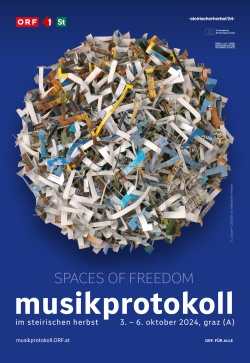Spaces of Freedom
3.10.‒6.10., Graz
Open spaces are spaces of possibility. Music as a form of expression and entertainment needs these spaces to develop. ORF musikprotokoll 2024 asks: What do restrictions and expansions of free spaces do to music, its creators, and last but not least, to us as listeners? We want to address how sociopolitical conditions, artistic approaches, and the growing presence of artificial intelligence (AI) enable open spaces in musical contexts. To this end, we have commissioned numerous compositions in which the composers take up the thread and explore self-created spaces of freedom with very different approaches.
Musical limitations are often intentional and an essential part of composed music. At ORF musikprotokoll 2024, the ORF Vienna Radio Symphony Orchestra (ORF RSO Wien) explores boundaries in a stylistically diverse concert with over eighty musicians. Winfried Ritsch has been further developing his eighty-eight-voice, lightning-fast Autoklavierspieler (auto piano player) for twenty years. The Graz-based Ensemble Zeitfluss is the first ensemble to embark on this human-machine adventure. PHACE’s commissions dance between AI, seemingly endless loops, and the poetry of balloons. The central question is: How do AI, robotics, and virtual reality affect the freedoms of contemporary composing?
In the music and research project (Musical) Improvisation and Ethics, the Splitter Orchester and the Trondheim Jazz Orchestra explore the dynamics of making music together. The oldest church in Graz, the Leechkirche, is the starting point for an acoustic research journey through Elisabeth Schimana's composition Virus, which calls indirectly for personal positioning in times of sociopolitical upheaval. Schimana's electronically generated sounds are interpreted in real-time by musicians from the Black Page Orchestra.
SHAPE+ offers insight into the latest developments in European scenes. Three artists from the pool of our long-standing EU festival network present their music during the festival. In two SHAPE+ Artist Residencies, artists from abroad will create new works with two locally rooted artists.
Thirty years after his death, Hermann Markus Preßl continues to shape the Graz music scene as a mystical figure. Students from the University of Music and Performing Arts Graz pay homage to his work in an extraordinary five-hour concert evening titled Das Heilige Nichts (The Holy Nothing). The audience listens to the music of this exceptional composer while sitting, lying down, and strolling.
Everything begins with listening. At the University of Graz, the workshop series Perception, Listening, Mimesis, and Criticism will explore how concentrated listening to music creates a specific quality of experience and action that changes the performance situation for all involved. At ARTikulationen, artists and scholars explore the question of artistic limitations, paths to knowledge, and unconventional scopes for experimentation in the context of artistic research.
This edition of the festival has much more to offer: a live Ö1 Klassik-Treffpunkt; the presentation of the award-winning works from the Student 3D Audio Production Competition 2024; a late-night music track in the Graz city center; a book presentation on Olga Neuwirth; an “anti-linguistic tragedy” by Styria Artist-in-Residence Ruhail Qaisar, who has traveled to the Styrian capital from the northern Indian Himalayas; the performance game over, in which Christof Ressi explores the artistic potential of computer games; and an afternoon concert with the Ukrainian singer and pianist Viktoriia Vitrenko that shows how deeply war inscribes itself into the political, social, and cultural levels of a society.
Curated by Rainer Elstner, Susanna Niedermayr, and Frank Zimmer
Direction: Elke Tschaikner
Production: ORF Radio Österreich 1 and ORF Steiermark
Coproduced with steirischer herbst ʼ24
In cooperation with Artistic Research Center at mdw – University of Music and Performing Arts Vienna, Institute for Art and Musicology at the University of Graz, Café Wolf, CTM Festival, esc medien kunst labor, ICAS – International Cities of Advanced Sound, IEM – Institute for Electronic Music and Acoustics, Institute 1 Composition, Theory of Music, History of Music and Conducting at KUG – University of Music and Performing Arts Graz, Klangforum Wien, Music Biennale Zagreb, PPCM – Performance Practice in Contemporary Music Instrumental and Vocal, Acoustics Research Institute at ÖAW – Austrian Academy of Sciences, KUG Doctoral School for Artistic Research, Ö1 Sound Art: Kunst zum Hören, ÖGZM – Austrian Society of Contemporary Music, FWF – Austrian Science Fund, SHAPE+ Sound, Heterogeneous Art and Performance in Europe, Pro Helvetia, Sounding Future, VDT – Verband Deutscher Tonmeister*innen, KUG Vocal Ensemble.
Supported by AVL Cultural Foundation, Federal Ministry of Arts, Culture, Civil Service and Sport, European Union “Creative Europe” Program, Province of Styria, City of Graz, SKE Fonds, VGR—Verwertungsgesellschaft Rundfunk.
